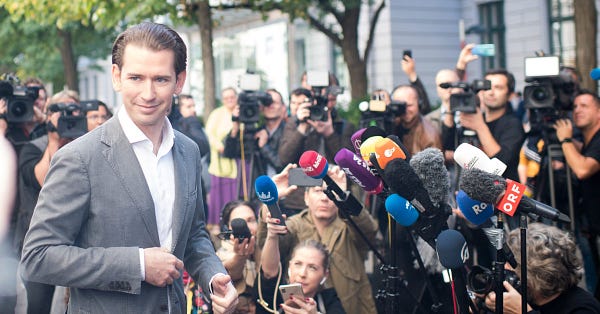Whither the Wiener Zeitung?
The future of Austria's oldest newspaper hangs in the balance as it looks set to lose its single-largest source of revenue at year's end
Servus!
On May 3, World Press Freedom Day, all of Austria’s daily newspapers ran with the same front page which asked the question: What would it be like if there were only one opinion? That is the reality in some European countries like Poland and Hungary where far-right populist government have successfully brought the press to heel, negating the independence of publicly-owned media while strangling publications in private hands. In Austria, this prospect seems far-out, but if not one opinion, the country may soon have one fewer if the Wiener Zeitung folds at the end of the year.
Established in 1703 and published Tuesdays through Saturdays, the Wiener Zeitung is unusual for two reasons. First, because it is owned by the state though retains complete editorial independence. Second, because its main source of income for decades has been fees paid for publishing formal announcements in its official gazette supplement—things like job opportunities in the civil service or changes to the status of firms listed in the companies’ register. A proposed change in Austrian and European law would mean such notices will no longer legally required, and thus does the Wiener Zeitung face a financial crunch and an existential crisis.
Chancellor Sebastian Kurz does not believe it is the federal government’s role to go on running and funding this or any newspaper. He supports the Wiener Zeitung going online only, functioning as little more than the state’s bulletin board—a death knell for the paper. Writing in Politico, Nette Nöstlinger and Matthew Karnitschnig attribute this view to a desire to “snuff out critical press coverage,” noting that Kurz’s government has funnelled millions of Euros to friendly publications via government advertising, all while the state broadcaster ORF has “faced persistent interventions from Kurz’s government in news coverage.”


Austria has more quality newspapers than one might expect for a country of its size though perhaps fewer than it needs. In terms of national dailies, there is the Standard on the left-liberal side of the argument and the Presse on the pro-market right: the Austrian equivalents of Le Monde and Le Figaro. Austria also has a number of fine regional newspapers, the Salzburger Nachrichten and the Vorarlberger Nachrichten among them. The Falter, meanwhile, keeps alive the tradition of the pugnacious investigative alt-weekly.
But there is also a lot of dross and a number of servile, pro-government rags (without wishing to name names) that are practically unreadable, and Raffael Reithofer argues that no Austrian newspaper quite has the status, muscle, or reach of the Neue Zürcher Zeitung in Zurich (a favorite of Thomas Bernhard) or the Süddeutsche Zeitung in Munich. The demise of the Wiener Zeitung would remove one more decent newspaper from newsagents’ racks and put a number of fine journalists and editors out of work in an industry that is already suffering under economic and political pressure.


Supporters are casting around for a solution that would keep the Wiener Zeitung alive. Representatives of the Presseclub Concordia proposed Monday that the state should place the newspaper in a trust with a minimum three-year shelf-life until a new owner or economic model for the paper can be found. A number of prominent former politicians, among them ex-chancellor Christian Kern, suggest the state should continue to subsidize the Wiener Zeitung to the tune of around €10 million a year. All this pressure, however, is coming from without and concerns a limited number of individuals. If the government is to change course and save the paper, it will require Kurz’s governing partner, the Greens, to demand it from within.
Bis bald!
Thank you for subscribing to the Vienna Briefing. Do you know someone who would be interested in receiving this newsletter? Consider sharing it with them today.
Kurz Under Investigation
State anti-corruption authorities are reported to have launched investigation proceedings against Sebastian Kurz and his aide, Bernhard Bonelli. The pair are suspected of having made false statements concerning the appointment of members to the board of Austria Holding PLC in front of a parliamentary investigative committee.
Blümel Survives
Finance minister Gernot Blümel survived an impeachment vote in the lower house of the Austrian parliament Monday. The vote came after Austria’s Constitutional Court tasked the country’s president, Alexander Van der Bellen, with delivering documents held by Blümel’s ministry to the parliamentary committee investigating the Ibiza affair which brought down the ÖVP-FPÖ coalition in May 2019.
One Dose Will Do
Austrians will be eligible for the country’s ‘green pass’ 21 days after their first dose of a coronavirus vaccine, ministers confirmed Monday, though they will need to get their second within three months if they are to keep it. Those who have recovered from the virus in the past six months or possess a negative test result no more than 24 to 72 hours old will also be able to enter restaurants, hotels, and gyms when they reopen May 19.




